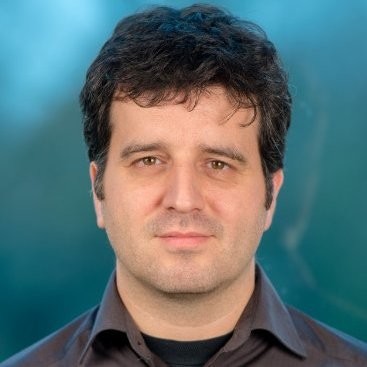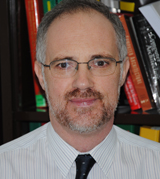|
|
Keynotes
 |
Tools for Embedded Systems programming: from Research to Development
Orlando Moreira,
GrAI Matter Labs
|
|
Abstract
A considerable part of the effort in the area of digital signal processing systems is targeted towards the development of tools - compilers, mappers, schedulers and simulators. However, many of the ideas stemming from research fail to thrive in an industrial setting. This presentation will discuss some of the challenges -both technical and managerial - encountered in making a tool successfully transition from research to a development environment. These challenges will be illustrated with examples from the work that the presenter has carried out at Philips Research, NXP, Ericsson and Intel.
Short Bio
Dr. Orlando Moreira is currently a Senior Principal Engineer and the Director of Software development at GrAI Matter Labs, a neuromorphic chip design startup. From 2015 to August 2018 he lead the programming tools group for imaging and camera systems at Intel Corporation.
He graduated in Electronics and Telecommunications Engineering from the University of Aveiro. He holds a PhD degree in Electrical Engineering from the Eindhoven University of Technology, with a thesis on real-time analysis and scheduling for streaming in embedded multiprocessors.
He worked at Philips Research (2000-2007), NXP Semiconductors (2007-2008), ST-Ericsson/Ericsson (2008-2015). In the period 2007-2009, he lead a joint Nokia, NXP, and ST-Ericsson team developing a hard real-time software architecture for multi-radio modems. At Ericsson, he lead a system architecture study on Dual Sim Dual Call. He has published research on reconfigurable computing, real-time multiprocessor scheduling, resource management, and temporal analysis of data flow.
|
 |
Making the transition from sensors to sensor systems software
Simon Dobson,
University of St Andrews
|
|
Abstract
Signal processing underpins everything we do with sensors.
The physical limits of sensors, and the effects of their exposure to their environment, in turn constrain their accuracy, and therefore affect the trust we can place in sensor-driven systems. But this is a long pipeline, and it's by no means clear how to trace from low-level errors and inaccuracies to their high-level consequences. In this talk I will try to tease-out some of the desiderata we might look for in such a pipeline, with a view to understanding how we can go about building sensor systems that deserve our trust.
Short Bio
Simon Dobson is Professor of Computer Science in the School of Computer Science at the University of St Andrews. He works on complex and sensor systems, especially on sensor analytics and the modelling of complex processes. His research has generated over 150 internationally peer-reviewed publications, driven by leadership roles in research grants worth over EUR30M, most recently as part of a £5M EPSRC-funded programme grant in the Science of Sensor Systems Software.
He has served, amongst other activities, as programme and general chairs for the IEEE International Conference on Autonomic Computing; as an associate editor of ACM Transactions on Autonomous and Adaptive Systems; as a member of UKCRC, the expert committee on UK computing research; and on the programme committees of a wide range of leading international conferences and specialised workshops. He holds a BSc from the University of Newcastle upon Tyne and DPhil from the University of York, both in computer science, is a Chartered Fellow of the British Computer Society, a Chartered Engineer and Senior Member of the IEEE and ACM.
|
 |
Modular Arithmetic and Signal Processing: Emerging Applications and Technologies
Leonel Sousa,
IST/INESC-ID
|
|
Abstract
Energy efficiency, limited power consumption and increased performance will drive the design of new
architectures and arithmetic units. Unconventional number systems, namely Residue Number Systems
(RNS), and modular arithmetic may hold the answer to these emerging challenges. In this talk we show
how to use the RNS to improve cryptographic algorithms and engines, making them more efficient and
more resistant to side-channel attacks, not only in the context of traditional cryptography but also of
emerging post-quantum cryptography. Moreover, the potential of RNS to support the high-performance
implementation of deep convolutional neural networks (DCNNs) is unveiled. Emerging technologies are
also targeted in this talk, namely the implementation of RNS arithmetic units with reversible logic to
improve density, speed and energy efficiency.
Short Bio
Leonel Sousa is currently Full Professor and Chair of the Electrical and Computer Engineering
Department at the IST, Universidade de Lisboa and a Senior Researcher with the INESC-ID in Portugal.
He has been vising professor in several universities abroad, he spent a few months in Japan with a
prestigious JSPS Invitation Fellowship for Research and he has been at the Carnegie Mellon University.
His research interests include high performance computing, computer architectures, computer
arithmetic and multimedia systems.
He has given more than 30 keynotes, invited talks and tutorials, he
has authored or co-authored more than 250 papers appearing in international journals and conferences
and edited five special issues of international journals. He served in the organization of several
international conferences and he is currently an Associate Editor of the IEEE Transactions on Computers,
IEEE Transactions on Multimedia and IEEE Transactions on Circuits and Systems for Video Technology.
He is member of the IFIP WG10.3 on concurrent systems, Fellow of the IET and Distinguished Scientist of
the ACM.
|
|
|



